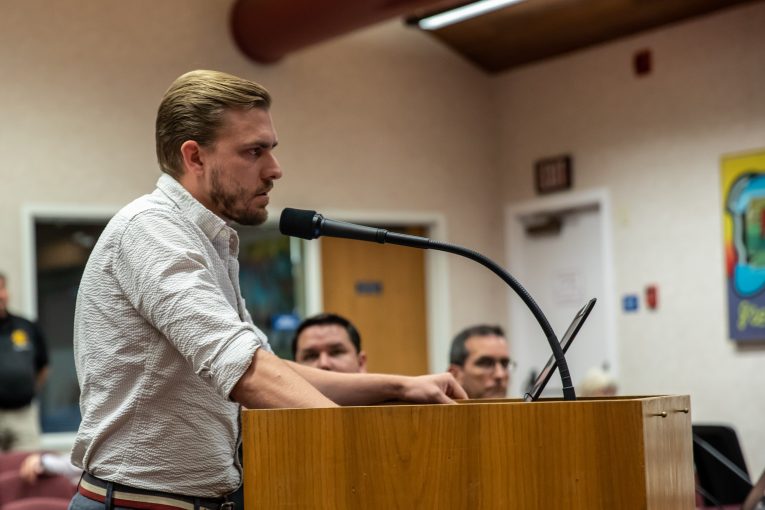

With all the talk about anonymous comments on the Vanguard, I thought it might be a good idea to look at who makes about the least anonymous comments of all – those who get up and speak at the city council meeting. So I pulled from the minutes of the meetings to compile a full year’s worth of public comments and see who was commenting.
For the year of 2018, there were a total of 497 public comments made at city council meetings. Of those 184 were made during the designated public comment period, but 313 were made in response to individual items.
Calculating it out, if each of the 497 people average 3 minutes, the council and members of the community spent an entire day out of their lives in 2018 listening to public comments – 24 hours of commenting.
In total, 234 different people made public comments. Of those 164 of them made a single comment
during the course of the year (I was one of those by the way, my only  comment
in 2018 was to donate a photo along with Don Sherman to the City). Another 31 made just two comments. 195 people therefore made either one or two
comments during the course of the year.
comment
in 2018 was to donate a photo along with Don Sherman to the City). Another 31 made just two comments. 195 people therefore made either one or two
comments during the course of the year.
That means the remaining 39 people made 271 comments of the comments in 2018
It turns out the top 2 comments combined made 51 comments. Few of the council were surprised by the top two. No.1 was Connor Gorman with 28 comments. No.2 was Alan Hirsch with 23 comments.
There is then a gap, Ron Glick was No.3 with 14 comments. No.4 was Eric Gudz with 13 and No.5 was a tie between Elaine Roberts-Musser and M.E. Gladys each with 11.
The next two were tied at 10 – Alan Pryor and Larry Guenther.
23 comments made at least five public comments. The top 20 (extending down as low as 5 comments) combined for 215 comments – nearly as many comments as the 195 people who made one or two comments combined.
There is of course a cyclical nature to all of this – some people who made fairly few comments in the last year had previously made quite a few comments. On the other hand, some people have grown much more active over time and are making a good deal more in the way of public comments now than in the past.
—David M. Greenwald reporting


Have you polled the CC to see which they find most annoying?
People named “Alan”.
I think the more interesting question is which they find to be most effective.
That would be more difficult to determine. I suspect the more people appear the less effective they are but that is just speculation. We have lots of “activists” but they often don’t represent anyone but themselves despite personal delusions.
. . . I believe you mean BECAUSE of personal delusions.
I would tend to believe people are deemed “most effective” by how closely they align politically with a particular council member.
Not an unreasonable ‘default’ assessment, but I suspect that most can identify effective speakers even when they disagree with the content of the speech, and I doubt anyone has trouble identifying speakers who completely fail to deliver a cogent message regardless of their position.
True enough, MW.
I’ve had conversations with many policymakers management staff on a municipal level of government, asking them for insights on what influences them the most in forming an opinion and conclusion. Even more insightful, is overhearing what they say to each other in a social setting. For example, after a Council meeting, a small collation of council members and staff would gather at a local pub to unwind and reflect. Sometimes a press rep would join the group with the understanding that anything said was “deep background” in journalism speak.
Workshops at annual League of California Cities would discuss public comment and input. Hundreds of municipal level staff and politicians from all over the State would attend and actively participate.
This research was for selfish reasons, I’d want to know what was most effective in persuading policymakers to support my agenda and aims. The summation of information gathered is really not that surprising or difficult to employ. Yet, self-anointed advocates never seem to use these simple techniques and there is a fundamental reason why. Community activists, advocates, naysayers, and the like are much more interested in being seen than being persuasive. They have the illusion that repetition and volume are persuasive, political threats are effective, rhetoric trumps logic, and the longer you speak the better you get and the more effective you become. All false. Persons using these pedestrian measures at public meetings are usually received with silent contempt and seldom listened to.
Public policymakers are persuaded by succinct and articulate summations demonstrating much thought and research. Advocates should strive to not appear to be advocating. Data and reference material is mentioned in passing and never is quoted in more than one sentence.
There’s much more, but for those who feel “public comment” is really effective, another reality, sorry. Politicians usually have decided on an issue before a public meeting has begun. Yes, they can be changed to a different position but instances are rare.
Small enough to avoid violating the Brown Act?
Yup.